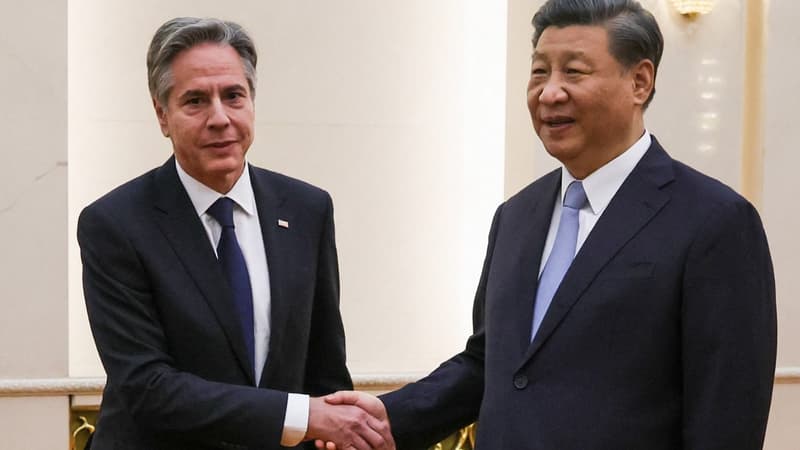As tension issues between China and the United States mount, the two countries try to make a move towards each other. Among the points of conflict between the two powers: the question of ties between the United States and Taiwan, an island claimed by Beijing, technological rivalry, US sanctions against Chinese digital giants, trade, the treatment of the Uyghur Muslim minority. in China or Chinese claims in the South China Sea.
It is in this context that US Secretary of State Anthony Blinken paid a visit to Beijing on Sunday and Monday. The US equivalent of the foreign secretary met on Monday with the Chinese Communist Party’s top diplomatic official, Wang Yi, and then with President Xi Jinping.
“Progress” and Disagreements
During the meeting, the latter praised the “progress” and the “common points” between Beijing and Washington, despite the tensions, in a video broadcast on CCTV public television. For his part, Blinken assured that the United States and China want to “stabilize” their relations, but said he was “lucid” about the deep bilateral disagreements.
“We are under no illusions about the challenges of managing this relationship. There are many issues on which we strongly, even vehemently, disagree,” he told reporters.
The US Secretary of State said he raised several of these contentious issues and expressed Washington’s concern over “provocative” actions in the Taiwan Strait, but also in Xinjiang, Tibet and Hong Kong. Antony Blinken said Monday that the United States does not support Taiwan independence.
China’s “unique position” on North Korea
Listing the other issues discussed with his Chinese interlocutors, the Secretary of State indicated that he has asked China to use its influence on North Korea to stop its missile launches.
“It is in the interest of all members of the international community to encourage (North Korea) to act responsibly, stop launching missiles and stop carrying out its nuclear program,” Blinken said. “China is in a unique position to put pressure on Pyongyang to enter into dialogue and stop its dangerous behavior,” he said.
“The two sides have made progress (this Monday morning) and have reached common ground on some specific points,” Xi Jinping said without specifying these points, calling the progress “something very good,” according to a video released by CCTV public television.
“I hope that through this visit, Secretary of State Blinken will bring a positive outcome to the stabilization of China-US relations,” Xi Jinping told his interlocutor.
“No concessions” on Taiwan
On Monday morning, Wang Yi told Antony Blinken that Beijing and Washington, having reached a “critical moment” in their relations, had to choose “between dialogue and confrontation, cooperation and conflict,” according to CCTV. . The Chinese official, who has the upper hand in China over Chinese foreign policy, also strongly reaffirmed his country’s position on the Taiwan issue.
China considers Taiwan one of its provinces, which it has yet to successfully reunify with the rest of its territory since the end of the Chinese Civil War in 1949.
“Maintaining national unity is always at the heart of China’s fundamental interests” and “on this issue, China will not make any compromises or concessions,” Wang Yi told Antony Blinken.
Beijing says it opposes what it perceives as a continued rapprochement in recent years between Washington and the Taiwanese authorities, a pro-independence party.
The two countries announced on Sunday that Chinese Foreign Minister Qin Gang had accepted an invitation from his US counterpart to visit the United States at a date yet to be determined.
Source: BFM TV


